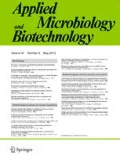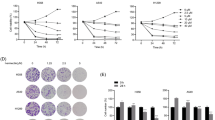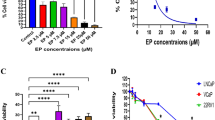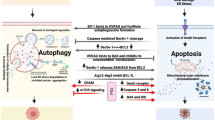Abstract
Due to the high mortality rate and an increase in breast cancer incidence, it has been challenging for researchers to come across an effective chemotherapeutic strategy with minimum side effects. Therefore, the need for the development of effective chemotherapeutic drugs is still on the verge. Consequently, we approached a new mechanism to address this issue. The naturally available peptide named latcripin-7A (LP-7A), extracted from a mushroom called Lentinula edodes, provided us promising results in terms of growth arrest, apoptosis, and autophagy in breast cancer cells (MCF-7 and MDA-MB-231). Expressions of protein markers for apoptosis, autophagy, and cell cycle were confirmed via Western blot analysis. Migration and invasion assays were performed to analyze the anti-migratory and anti-invasive properties of LP-7A, while cell cycle analysis was performed via flow cytometry to evaluate its affect over cell growth. Supportive assays were performed like acridine orange, Hoechst 33258 stain, DNA fragmentation, and mitochondrial membrane potential (MMP) to further confirm the anticancer effect of LP-7A on breast cancer cell lines. It is concluded that LP-7A effectively reduces migration and promotes apoptosis as well as autophagy in MCF-7 and MDA-MB-231 breast cancer cell lines by inducing cell growth arrest at G0/G1 phase and decreasing mitochondrial membrane potential without adverse effects on MCF-10A normal breast cells.
Key points
• In this study, we have investigated the anti-cancer activity of novel latcripin-7A (LP-7A), a protein extracted as a result of de novo characterization of Lentinula edodes C91–3.
• We conclude in our research work that LP-7A can initiate diverse cell death-related events, i.e., apoptosis and autophagy in both triple-positive and triple-negative breast cancer cell lines by interacting with different nodes of cellular signaling that can further be investigated in vivo to gain a better understanding.






Similar content being viewed by others
References
Altomare DA, Testa JR (2005) Perturbations of the AKT signaling pathway in human cancer. Oncogene 24(50):7455–7464. https://doi.org/10.1038/sj.onc.1209085
Anderson BO, Yip CH, Smith RA, Shyyan R, Sener SF, Eniu A, Carlson RW, Azavedo E, Harford J (2008) Guideline implementation for breast healthcare in low-income and middle-income countries: overview of the breast health global initiative global summit 2007. Cancer 113(8 Suppl):2221–2243. https://doi.org/10.1002/cncr.23844
Ann XH, Lun YZ, Zhang W, Liu B, Li XY, Zhong MT, Wang XL, Cao J, Ning AH, Huang M (2014) Expression and characterization of protein latcripin-3, an antioxidant and antitumor molecule from Lentinula edodes C91-3. Asian Pac J Cancer Prev 15(12):5055–5061. https://doi.org/10.7314/apjcp.2014.15.12.5055
Balasubramanian K, Mirnikjoo B, Schroit AJ (2007) Regulated externalization of phosphatidylserine at the cell surface: implications for apoptosis. J Biol Chem 282(25):18357–18364. https://doi.org/10.1074/jbc.M700202200
Ballazhi L, Imeri F, Jashari A, Popovski E, Stojkovic G, Dimovski AJ, Mikhova B, Mladenovska K (2017) Original research paper. Hydrazinyldiene-chroman-2,4-diones in inducing growth arrest and apoptosis in breast cancer cells: synergism with doxorubicin and correlation with physicochemical properties. Acta Pharma 67(1):35–52. https://doi.org/10.1515/acph-2017-0006
Batool S, Joseph TP, Hussain M, Vuai MS, Khinsar KH, Din SRU, Padhiar AA, Zhong M, Ning A, Zhang W, Cao J, Huang M (2018) LP1 from Lentinula edodes C91-3 induces autophagy, apoptosis and reduces metastasis in human gastric cancer cell line SGC-7901. Int J Mol Sci 19(10):2986. https://doi.org/10.3390/ijms19102986
Bisen PS, Baghel RK, Sanodiya BS, Thakur GS, Prasad GB (2010) Lentinus edodes: a macrofungus with pharmacological activities. Curr Med Chem 17(22):2419–2430. https://doi.org/10.2174/092986710791698495
Chambard JC, Lefloch R, Pouyssegur J, Lenormand P (2007) ERK implication in cell cycle regulation. Biochim Biophys Acta 1773(8):1299–1310. https://doi.org/10.1016/j.bbamcr.2006.11.010
Chen W, Li Z, Bai L, Lin Y (2011) NF-kappaB in lung cancer, a carcinogenesis mediator and a prevention and therapy target. Front Biosci (Landmark Ed) 16:1172–1185. https://doi.org/10.2741/3782
Chen T, Hao J, He J, Zhang J, Li Y, Liu R, Li L (2013) Cannabisin b induces autophagic cell death by inhibiting the AKT/mTOR pathway and S phase cell cycle arrest in HepG2 cells. Food Chem 138(2–3):1034–1041. https://doi.org/10.1016/j.foodchem.2012.11.102
Ferlay J, Shin HR, Bray F, Forman D, Mathers C, Parkin DM (2010) Estimates of worldwide burden of cancer in 2008: GLOBOCAN 2008. Int J Cancer 127(12):2893–2917. https://doi.org/10.1002/ijc.25516
Garcia-Rostan G, Costa AM, Pereira-Castro I, Salvatore G, Hernandez R, Hermsem MJ, Herrero A, Fusco A, Cameselle-Teijeiro J, Santoro M (2005) Mutation of the PIK3CA gene in anaplastic thyroid cancer. Cancer Res 65(22):10199–10207. https://doi.org/10.1158/0008-5472.CAN-04-4259
Han SS, Kim K, Hahm ER, Lee SJ, Surh YJ, Park HK, Kim WS, Jung CW, Lee MH, Park K, Yang JH, Yoon SS, Riordan NH, Riordan HD, Kimler BF, Park CH, Lee JH, Park S (2004) L-ascorbic acid represses constitutive activation of NF-kappaB and COX-2 expression in human acute myeloid leukemia, HL-60. J Cell Biochem 93(2):257–270. https://doi.org/10.1002/jcb.20116
Han SS, Kim K, Hahm ER, Park CH, Kimler BF, Lee SJ, Lee SH, Kim WS, Jung CW, Park K, Kim J, Yoon SS, Lee JH, Park S (2005) Arsenic trioxide represses constitutive activation of NF-kappaB and COX-2 expression in human acute myeloid leukemia, HL-60. J Cell Biochem 94(4):695–707. https://doi.org/10.1002/jcb.20337
Hernandez H, Roberts AL, McDowell CM (2020) Nuclear factor-kappa beta signaling is required for transforming growth factor beta-2 induced ocular hypertension. Exp Eye Res 191:107920. https://doi.org/10.1016/j.exer.2020.107920
Jong SC, Birmingham JM (1993) Medicinal and therapeutic value of the shiitake mushroom. Adv Appl Microbiol 39:153–184. https://doi.org/10.1016/s0065-2164(08)70595-1
Joseph TP, Chanda W, Padhiar AA, Batool S, LiQun S, Zhong M, Huang M (2018) A preclinical evaluation of the antitumor activities of edible and medicinal mushrooms: a molecular insight. Integr Cancer Ther 17(2):200–209. https://doi.org/10.1177/1534735417736861
Karin M (2006) Nuclear factor-kappaB in cancer development and progression. Nature 441(7092):431–436. https://doi.org/10.1038/nature04870
Kim YN, Koo KH, Sung JY, Yun UJ, Kim H (2012) Anoikis resistance: an essential prerequisite for tumor metastasis. Int J Cell Biol 2012:306879–306811. https://doi.org/10.1155/2012/306879
Li JM, Brooks G (1999) Cell cycle regulatory molecules (cyclins, cyclin-dependent kinases and cyclin-dependent kinase inhibitors) and the cardiovascular system; potential targets for therapy? Eur Heart J 20(6):406–420. https://doi.org/10.1053/euhj.1998.1308
Li VS, Wong CW, Chan TL, Chan AS, Zhao W, Chu KM, So S, Chen X, Yuen ST, Leung SY (2005) Mutations of PIK3CA in gastric adenocarcinoma. BMC Cancer 5:29. https://doi.org/10.1186/1471-2407-5-29
Li T, Mello-Thoms C, Brennan PC (2016) Descriptive epidemiology of breast cancer in China: incidence, mortality, survival and prevalence. Breast Cancer Res Treat 159(3):395–406. https://doi.org/10.1007/s10549-016-3947-0
Lin HL, Yang MH, Wu CW, Chen PM, Yang YP, Chu YR, Kao CL, Ku HH, Lo JF, Liou JP, Chi CW, Chiou SH (2007) 2-Methoxyestradiol attenuates phosphatidylinositol 3-kinase/Akt pathway-mediated metastasis of gastric cancer. Int J Cancer 121(11):2547–2555. https://doi.org/10.1002/ijc.22963
Liu B, Zhong M, Lun Y, Wang X, Sun W, Li X, Ning A, Cao J, Zhang W, Liu L, Huang M (2012) A novel apoptosis correlated molecule: expression and characterization of protein Latcripin-1 from Lentinula edodes C(91-3). Int J Mol Sci 13(5):6246–6265. https://doi.org/10.3390/ijms13056246
Luo JL, Kamata H, Karin M (2005) IKK/NF-kappaB signaling: balancing life and death--a new approach to cancer therapy. J Clin Invest 115(10):2625–2632. https://doi.org/10.1172/JCI26322
Mook OR, Frederiks WM, Van Noorden CJ (2004) The role of gelatinases in colorectal cancer progression and metastasis. Biochim Biophys Acta 1705(2):69–89. https://doi.org/10.1016/j.bbcan.2004.09.006
Padhiar AA, Chanda W, Joseph TP, Guo X, Liu M, Sha L, Batool S, Gao Y, Zhang W, Huang M, Zhong M (2018) Comparative study to develop a single method for retrieving wide class of recombinant proteins from classical inclusion bodies. Appl Microbiol Biotechnol 102(5):2363–2377. https://doi.org/10.1007/s00253-018-8754-6
Porter P (2008) “Westernizing” women’s risks? Breast cancer in lower-income countries. N Engl J Med 358(3):213–216. https://doi.org/10.1056/NEJMp0708307
Ramamoorthy A, Mahendra J, Mahendra L, Govindaraj J, Samu S (2020) Effect of sudharshan kriya pranayama on salivary expression of human beta defensin-2, peroxisome proliferator-activated receptor gamma, and nuclear factor-kappa b in chronic periodontitis. Cureus 12(2):e6905. https://doi.org/10.7759/cureus.6905
Rincao VP, Yamamoto KA, Ricardo NM, Soares SA, Meirelles LD, Nozawa C, Linhares RE (2012) Polysaccharide and extracts from Lentinula edodes: structural features and antiviral activity. Virol J 9:37. https://doi.org/10.1186/1743-422X-9-37
Samuels Y, Wang Z, Bardelli A, Silliman N, Ptak J, Szabo S, Yan H, Gazdar A, Powell SM, Riggins GJ, Willson JK, Markowitz S, Kinzler KW, Vogelstein B, Velculescu VE (2004) High frequency of mutations of the PIK3CA gene in human cancers. Science 304(5670):554. https://doi.org/10.1126/science.1096502
She T, Feng J, Lian S, Li R, Zhao C, Song G, Luo J, Dawuti R, Cai S, Qu L, Shou C (2017) Sarsaparilla (Smilax Glabra rhizome) extract activates redox-dependent ATM/ATR pathway to inhibit cancer cell growth by S phase arrest, apoptosis, and autophagy. Nutr Cancer 69(8):1281–1289. https://doi.org/10.1080/01635581.2017.1362447
Tasdemir E, Maiuri MC, Tajeddine N, Vitale I, Criollo A, Vicencio JM, Hickman JA, Geneste O, Kroemer G (2007) Cell cycle-dependent induction of autophagy, mitophagy and reticulophagy. Cell Cycle 6(18):2263–2267. https://doi.org/10.4161/cc.6.18.4681
Teixeira LFS, Peron JPS, Bellini MH (2020) Silencing of nuclear factor kappa b 1 gene expression inhibits colony formation, cell migration and invasion via the downregulation of interleukin 1 beta and matrix metallopeptidase 9 in renal cell carcinoma. Mol Biol Rep 47(2):1143–1151. https://doi.org/10.1007/s11033-019-05212-9
Wyllie AH (1980) Glucocorticoid-induced thymocyte apoptosis is associated with endogenous endonuclease activation. Nature 284(5756):555–556. https://doi.org/10.1038/284555a0
Wyllie AH, Kerr JF, Currie AR (1980) Cell death: the significance of apoptosis. Int Rev Cytol 68:251–306. https://doi.org/10.1016/s0074-7696(08)62312-8
Acknowledgments
We would like to acknowledge Muhammad Noman Ramzan for his contribution to our manuscript. We also acknowledge the International Education College of Dalian Medical University, Dalian, China, and the Chinese Scholarship Council for providing assistance.
Author information
Authors and Affiliations
Contributions
Conceptualization: S.R.U.D. and M.Z. Formal analysis: M.A.N. and M.Z.S. Investigation: S.R.U.D. Writing the first draft: M.A.N. and M.Z.S. Technical assistance: A.H., K.H.K., S.K., G.A., X.L., W.Z., X.W., A.N., and G.C. Review and editing: M.A.N and M.Z.S. Resources and supervision: M.H.
Corresponding author
Ethics declarations
Conflict of interest
The authors declare that they have no conflict of interests.
Ethical approval
This article does not contain any studies with animals performed by any of the authors.
Additional information
Publisher’s note
Springer Nature remains neutral with regard to jurisdictional claims in published maps and institutional affiliations.
Electronic supplementary material
ESM 1
(PDF 503 kb)
Rights and permissions
About this article
Cite this article
Din, S.R.U., Zhong, M., Nisar, M.A. et al. Latcripin-7A, derivative of Lentinula edodes C91–3, reduces migration and induces apoptosis, autophagy, and cell cycle arrest at G1 phase in breast cancer cells. Appl Microbiol Biotechnol 104, 10165–10179 (2020). https://doi.org/10.1007/s00253-020-10918-z
Received:
Revised:
Accepted:
Published:
Issue Date:
DOI: https://doi.org/10.1007/s00253-020-10918-z




